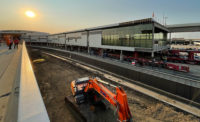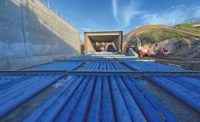Preparatory work is underway for a summer installation of a new concourse at Dallas-Fort Worth International Airport using prefabrication and modular methods—a first for U.S. airports, say officials. Three self-propelled modular transporters (SMPTs) will deliver six modules of the new five-gate concourse to the site, with the anticipation of saving up to four months on the schedule as compared with traditional methods.
Crews with a joint venture of the Walsh Group’s Archer Western, H.J. Russell, Phillips/May and PGAL began demolition of the old 72,000-sq-ft Terminal C extension with five gates in March. Construction of the three prefabricated modules for the new Terminal C High Gates has begun, says Julie Ludeman, DFW senior project manager.
The design-build portion of the project includes the building envelope, connections to site utilities, systems and connection to Terminal C. American Airlines handles a separate design-bid-build contract for interior fit-out. The concourse is expected to open in summer of 2022.
While the guaranteed maximum price for the design-build portion is still being determined, the value right now is $31 million, says Ludeman. The estimated total value is about $115 million, according to the project team.
The team drew upon experience with accelerated bridge construction to plan the transport of six modules, with the largest being 86 ft by 86 ft by 33 ft. The modules weigh up to 450 tons, says Thomas Haag, national director of aviation with the Walsh Group. “The tight tolerances necessitated smaller modules,” he adds. “If it had been a greenfield site, it would probably be two units.”
But the location is at an operating airport. “It’s a very active site, with a messy array of highways and buildings all around,” he says. “There’s the automated people mover; we can’t lift materials over it. The stick-build approach would have had a lot of challenges to mitigate.”
The modules will be completed in mid-August. Over a series of nights, the modules, complete with metal panels and glazing, will be transported a quarter mile and across a taxiway from the prefabrication yard to the site, says Ellen Wilson, senior project manager with the joint venture. “It will take about 30 minutes to get from the yard to the terminal,” she says. “All three SMPTs will move in parallel.”
The SMPTs, provided by Mammoet, can travel up to 5 mph. The modules will be jacked up onto columns and set in place. “In nine days, it will be a fully enclosed terminal,” Wilson says.
Maneuvering beneath the aerial guideway for the people mover and through the airport complex, the SMPTs will have only 2 to 4 ft of clearances, Haag says.
The team used Etabs to analyze models for various loading conditions, including when the modules are on the transporters, on support columns and braking forces, says Elaine Rogers, president of Henderson Rogers, the structural engineer of record. “We pushed the technology to the limit to cover all conditions.”
The modules won’t just be simple, identical big boxes, says Julie Gavin, the team’s design project manager. “We punctuate the modules with two or three infill areas to have a ‘wow’ moment,” she says.
Big Picture
The methods deployed to build the two-level, 80,000-sq-ft new concourse represent DFW’s evolution in project delivery, says Khaled Naja, DFW executive vice president. “We created interest in the [contracting] community about the future of design-build at DFW and advanced to prefabrication,” he says. “We’re always looking for the next big thing.”
Regarding state of good repair, “we have seven runways to redo, 133 bridges and 1,200 lane-miles of roads,” notes Naja. Although the pandemic put some $100 million in work on hold, this year the airport plans $300 million in construction.







Post a comment to this article
Report Abusive Comment